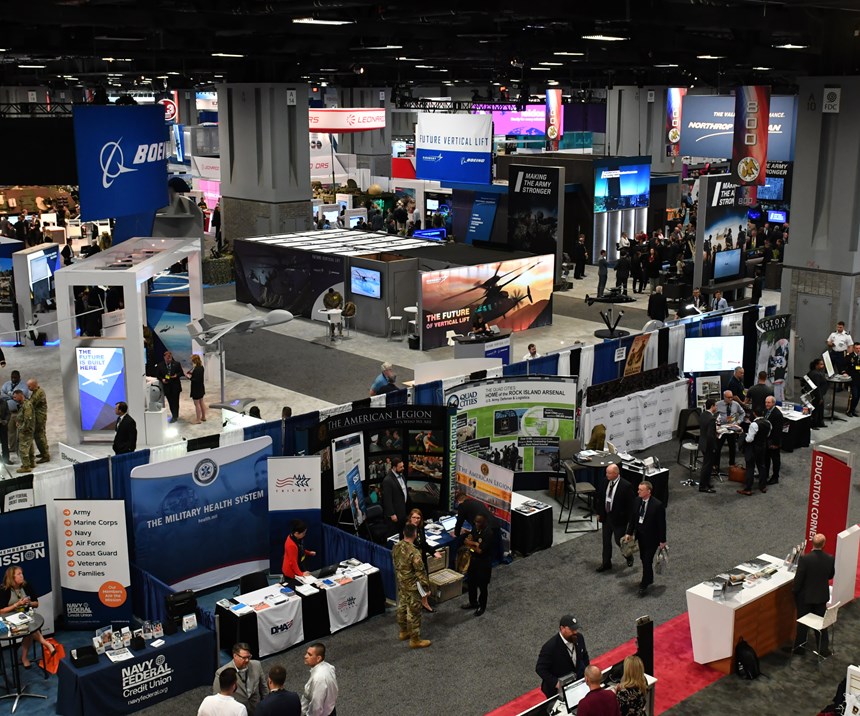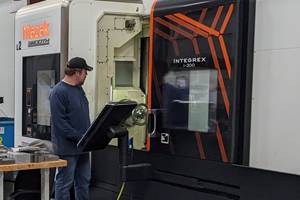Share








Takumi USA
Featured Content
View More


ECi Software Solutions, Inc.
Featured Content
View MoreAccording to published reports, the U.S. Department of Defense (DOD) is now spending billions of dollars annually on machined parts, a huge increase in recent years as all three branches of the armed services retool after sequestration budget constraints were lifted. In October 2018, a DOD news release noted that new suppliers to the defense industry are badly needed to maintain the country’s military readiness. It is likely that many of the machined parts DoD contractors need are similar to those that shops are already making or have the capability and capacity to make.
If you are interested in exploring this opportunity (and this seems an excellent time to do so), here are eight initial steps you should consider taking, as suggested to me by shops serving this industry. The main takeaway is that shops must first do their homework.
1. Get to know the industry.
One of the best ways to become acquainted with defense contracting is to attend industry trade shows and conferences. For example, the Association of the United States Army sponsors an annual meeting and exhibition, a three-day event at the Washington Convention Center in Washington, D.C. The exhibition is broadly focused on the needs, interests and activities of the US Army, including its procurement priorities. Many U.S. Army suppliers choose to introduce new products for this branch of the armed services at this show. The dates for 2019 are October 14 to 16. It is open to the public, with some restrictions.
The Sea-Air-Space Exposition is sponsored by the Navy League, which describes this global maritime exposition as “the key annual venue for military, government and industry leaders to conduct business, acquire education and develop a professional network.” The 2019 event took place in May in National Harbor, Maryland. It is not open to the public, and companies interested in attending must register and meet simple qualifications.
A technical conference more specifically targeted to manufacturers is the Defense Manufacturing Conference. Dates for 2019 are December 2 to 5 and it is held at the Phoenix Convention Center in Phoenix, Arizona. This annual event features an exhibit area and technical sessions about ongoing DOD manufacturing technology (ManTech) programs. The goal of ManTech is to develop technologies and processes for the affordable, timely production and sustainment of defense systems. Topics include advanced manufacturing, composites, munitions and metals.
The Aerospace Industries Association sponsors a spring and fall Management Council Meeting hosted by an AIA member company. Check the website for current meetings and dates. One of AIA’s current priorities is streamlining acquisition policies of the DOD as a means to improve the defense.
Other organizations to check out include the Submarine Industrial Base Council, which hosts an annual Supplier Days event in February and the Aircraft Carrier Industrial Base Collation, which hosts an annual Action Days event in March. The Missile Defense Agency and the Defense Logistics Agency have useful information about supplier opportunities, too. The National Defense Industry Association is a non-profit organization with individual and corporate membership packages. It has local chapters and regional events tailored to small businesses doing defense work.
2. Become certified.
Machine shops will find it advantageous to have certain certifications to verify their eligibility to bid on defense contracts. Keep in mind, however, that certification programs can be time-consuming and costly. They may involve audits or inspections by independent agencies, which charge for their services. One recommendation is to view these certifications as a learning tool or an internal standard for excellence. Certification can also be valuable to non-defense customers as well. They see the certificates as evidence of training, discipline and capability even if it not required for their work. Some of the most important certifications include ISO 9001, AS9100 and Nadcap.
ISO 9001 is the most widely adopted standard for quality management systems (QMS) in manufacturing and industry in general. Most shops pursue ISO 9001 certification because it is regarded as an essential indication that the shop is committed to the QMS specified in the standard. Broadly speaking, ISO 9001 certification assures that a company has documented quality procedures in place and follows them routinely.
In addition to ISO 9001 certification, shops interested in defense contracting may be required to comply with AS9100, the Aerospace Basic Quality System Standard, an interpretation of ISO 9001 developed by major aerospace manufacturers and suppliers. The latest update is AS9100 Revision D (2016) Quality Management System—Requirements for Aviation, Space and Defense Organizations. Originating as AS9000, this interpretation replaced the various quality system requirements that each aerospace manufacturer had developed for its subcontractors, thus avoiding the complexity and confusion that came when shops had many different systems to follow. The latest revision of AS9100 also includes aspects of traceability, safety and risk management.
Machine shops that wish to offer special processes and products may also need accreditation through Nadcap (formerly, the National Aerospace and Defense Contractors Accreditation Program). Nadcap is a global program under which a shop submits to audits verifying that its specialty meets industry-recognized criteria for quality, safety and reliability. In other words, the specialty must be shown to follow a checklist covering critical capabilities and precise procedures to ensure that work is properly performed. Shop specialties that may require Nadcap accreditation include welding, heat treating, nondestructive testing, product coating and many others. Nadcap accreditation gives contractors some assurance that the shop is competent in its certified processes.
An issue related to technical certification is being classified a small business or obtaining another special designation. The U.S. Small Business Administration provides guidelines about registering and becoming certified as a small business. Defense contractors may have an obligation to solicit the participation of companies with certified status, such as small, minority- or veteran-owned businesses.
3. Register as a supplier.
Many defense prime contractors also have registration programs by which subcontractors such as machine shops may apply. Upon approval, applicants can then be listed as qualifying companies eligible to bid on jobs for that contractor. Many primes will allow only registered shops to participate in their bidding process. Other contractors use the list to identify qualified suppliers from which they may solicit bids. Making the list can mean opening the door to new business opportunities.
Typically, these contractors have a website to support the supplier community. You can usually find out about a company’s registration program by visiting its site and finding the “supplier portal” link. There, you can find valuable information about the contractor’s policies, business terms, subcontracting needs and frequently asked questions. Lockheed Martin, for example, has a dedicated site for suppliers called Supplier Wire. The site also discusses topics such as cybersecurity, ethics, sustainability and supplier diversity that may interest you.
General Dynamics’ supplier site is similar. It has a link to a particularly rich list of supplier events and conferences. The vision and values statements at these sites deserve attention. Such statements at Boeing’s supplier site, for example, are representative of the high standards and ideals to which suppliers are also expected to aspire.
4. Keep vital technology safe.
All machine shops and manufacturers involved in defense work must be aware of U.S. regulations that restrict the export of defense- and military-related technology. These regulations, enforced by the U.S. Department of State, are referred to collectively as International Traffic in Arms Regulations (ITAR). Essentially, ITAR dictates that information and materials pertaining to defense technology cannot be shared with “foreign persons” without authorization. The purpose of ITAR is to protect U.S. national security by keeping technology away from adversaries.
Under ITAR, all U.S. manufacturers of controlled defense items (those that are identified in the U.S. Munitions List) must register with the U.S. Department of State and pay a fee. Registration must be renewed annually, along with paying the fee each year. Companies in the defense trade must also establish and follow an ITAR compliance program. Guidelines for setting up and maintaining such a program are available from the office of Defense Trade Controls Compliance. These guidelines detail the registration process, recordkeeping requirements and the procurement of export licenses. Because these regulations can be complicated and confusing, with severe penalties for violations, ITAR must be taken seriously.
5. Manage contracts carefully.
To do business with the U.S. government or its Tier One suppliers, one of the first things a shop should do is register with the System for Award Management (SAM), an official web platform (sam.gov/sam) created by the General Services Administration. SAM registration enables a company to identify itself as a business entity. This registration helps other government agencies recognize the company they are doing business with and what kind of company it is. Once a company has created a user account and completed the registration process, it will be given a Commercial and Government Entity (CAGE) code. The DOD and other contracting government agencies ask for this five-digit CAGE code to identify a given business facility at a specific location. SAM registration is free, but it must be renewed at least once a year.
When a shop wishes to sell machined parts or machining services directly to a government agency, the transaction must comply with the Federal Acquisition Regulation (FAR). Defense work must also comply with the Defense Federal Acquisition Registration Supplement (DFARS), which covers specific issues related to contracts awarded by the DOD.
FAR is intended to provide a set of uniform, government-wide principles and policies for how contracts are solicited, negotiated and awarded. The goal is to make the process fair, honest and equitable to all parties involved. Be aware that FAR and DFARS regulations run hundreds of pages in the law.
Unfortunately, these regulations can make managing government contracts the most daunting part of defense work. Doing business with government agencies and defense contractors can be significantly different than jobs acquired through the traditional request-for-quote process in private commerce. Important terms such as indemnification, offsets, rights of termination and warranties may be unfamiliar or have specific meanings in the context of defense contracting. As the manager of defense accounts at one large five-axis shop told me, a company might need legal advice to avoid costly mistakes due to misunderstandings. He advised that a shop might want to increase its margin to cover some of the costs and higher risks entailed in the bidding and contracting process. Of course, even if a bid is classified as “technically acceptable,” price will always be an important factor in what company wins the contract, he says.
6. Meet the technical challenges.
Although the potential for defense contracts is considerable, this kind of work does create more overhead, paperwork, quality assurance demands and greater risk. For some shops, it might also create technical challenges for the programming office, shop floor and other departments. For example, materials can be more difficult to machine (titanium and high-nickel alloys are common). If not provided by the defense customer, workpiece materials must be certified metallurgically and controlled when they are received. To assist in quoting and programming, part models are likely to be sent as STEP (Standard for the Exchange of Product) model data files, a format that might be unfamiliar to many shops.
Because batch quantities are generally lower than in other industries and are usually part of a critical system or assembly, defense customers often want weekly updates submitted by a certified program manager in Microsoft Project or other digital format. Likewise, incidents of quality non-conformance must be documented for corrective action and root cause analysis because processes need to be “locked down.”
7. Use online resources and search tools.
Once shop owners and managers are prepared for defense work, they have numerous resources for gathering information that will help them spot opportunities, keep up with developments and improve their chances of winning defense contracts. Here are a few examples.
- Defense Insider Daily. This source provides subscribers with daily email updates about new programs and contract awards.
- The Bloomberg Government Database. This subscription-based source offers general news and analysis of government affairs and government contracting.
- Federal Business Opportunities. This provides information about federal business opportunities, news about contract awards and user guides for vendors and buyers. It also has links to the SBA and the System for Awards Management. One option is to create a company profile and sign up to receive a daily email message with links to current requests for quotes.
8. Get a head start.
The effort to become a machine shop defense contractor can seem strenuous, and it must be approached patiently, one step at a time. The potential rewards extend beyond challenging and lucrative business opportunities. Shops involved in defense machining also are more likely to embrace the wave of digitalization and the move to integrated, data-driven manufacturing than other shops. For one reason, prime defense contractors are aggressively moving in this direction, and they need suppliers that can keep up and take part to the fullest. For another, the community of defense contractors and their suppliers have significant resources and incentives to share that can help machining job shops advance together.
Related Content
5 Tips for Running a Profitable Aerospace Shop
Aerospace machining is a demanding and competitive sector of manufacturing, but this shop demonstrates five ways to find aerospace success.
Read MoreIncreasing OEM Visibility to Shopfloor Operations for the Win
A former employee of General Motors and Tesla talks about the issues that led to shutdowns on factory lines, and what small- to medium-sized manufacturers can do today to win business from large OEMs.
Read MoreHow to Meet Aerospace’s Material Challenges and More at IMTS
Succeeding in aerospace manufacturing requires high-performing processes paired with high-performance machine tools. IMTS can help you find both.
Read MoreArch Cutting Tools Acquires Custom Carbide Cutter Inc.
The acquisition adds Custom Carbide Cutter’s experience with specialty carbide micro tools and high-performance burrs to Arch Cutting Tool’s portfolio.
Read MoreRead Next
Building Out a Foundation for Student Machinists
Autodesk and Haas have teamed up to produce an introductory course for students that covers the basics of CAD, CAM and CNC while providing them with a portfolio part.
Read More5 Rules of Thumb for Buying CNC Machine Tools
Use these tips to carefully plan your machine tool purchases and to avoid regretting your decision later.
Read MoreRegistration Now Open for the Precision Machining Technology Show (PMTS) 2025
The precision machining industry’s premier event returns to Cleveland, OH, April 1-3.
Read More




















.png;maxWidth=150)










.jpg;maxWidth=300;quality=90)





















